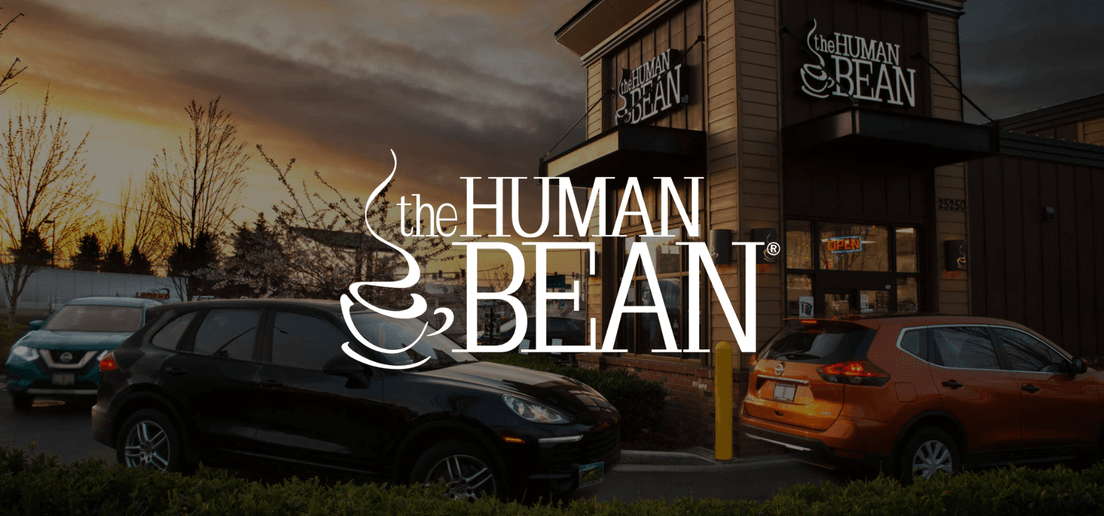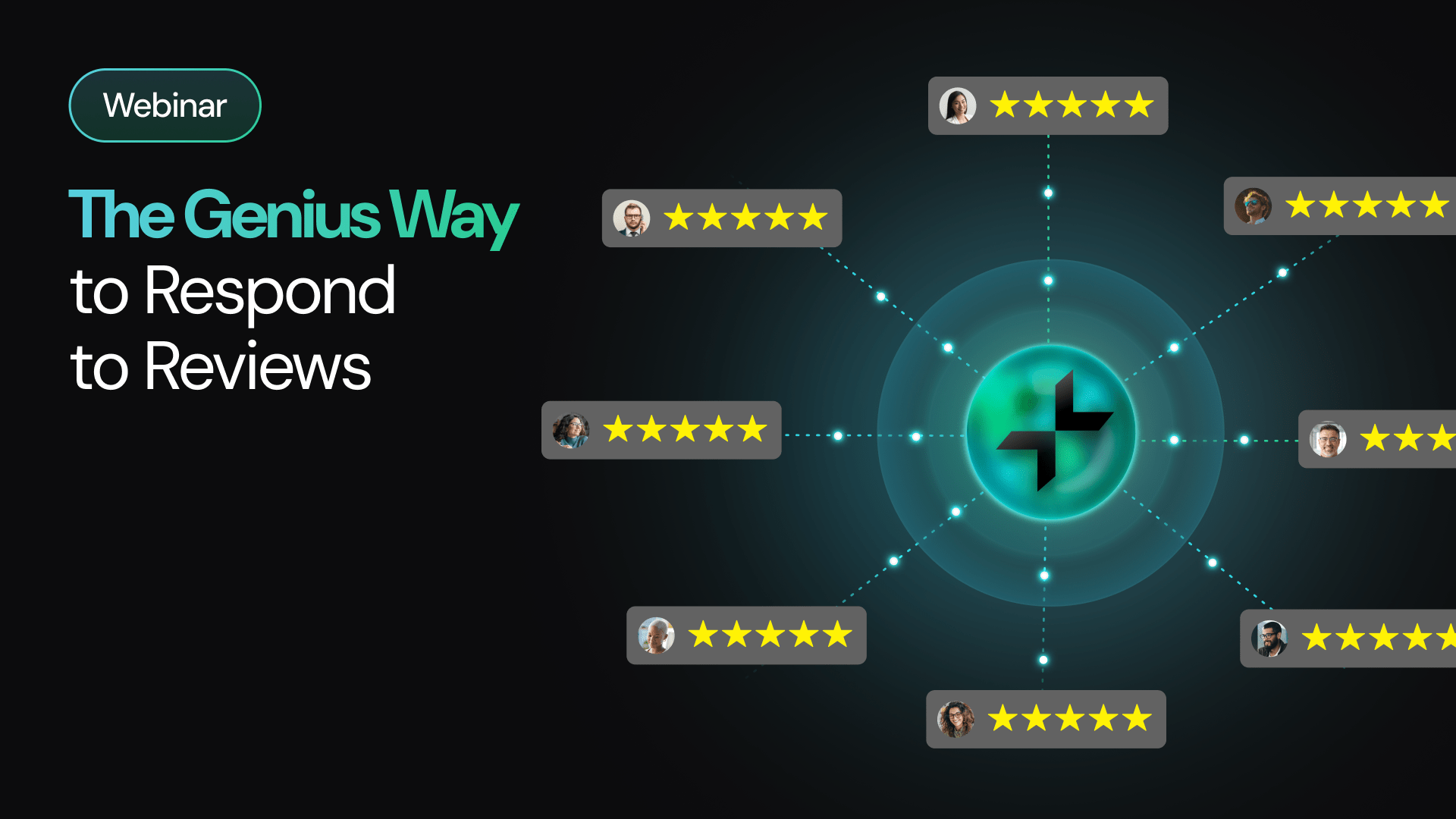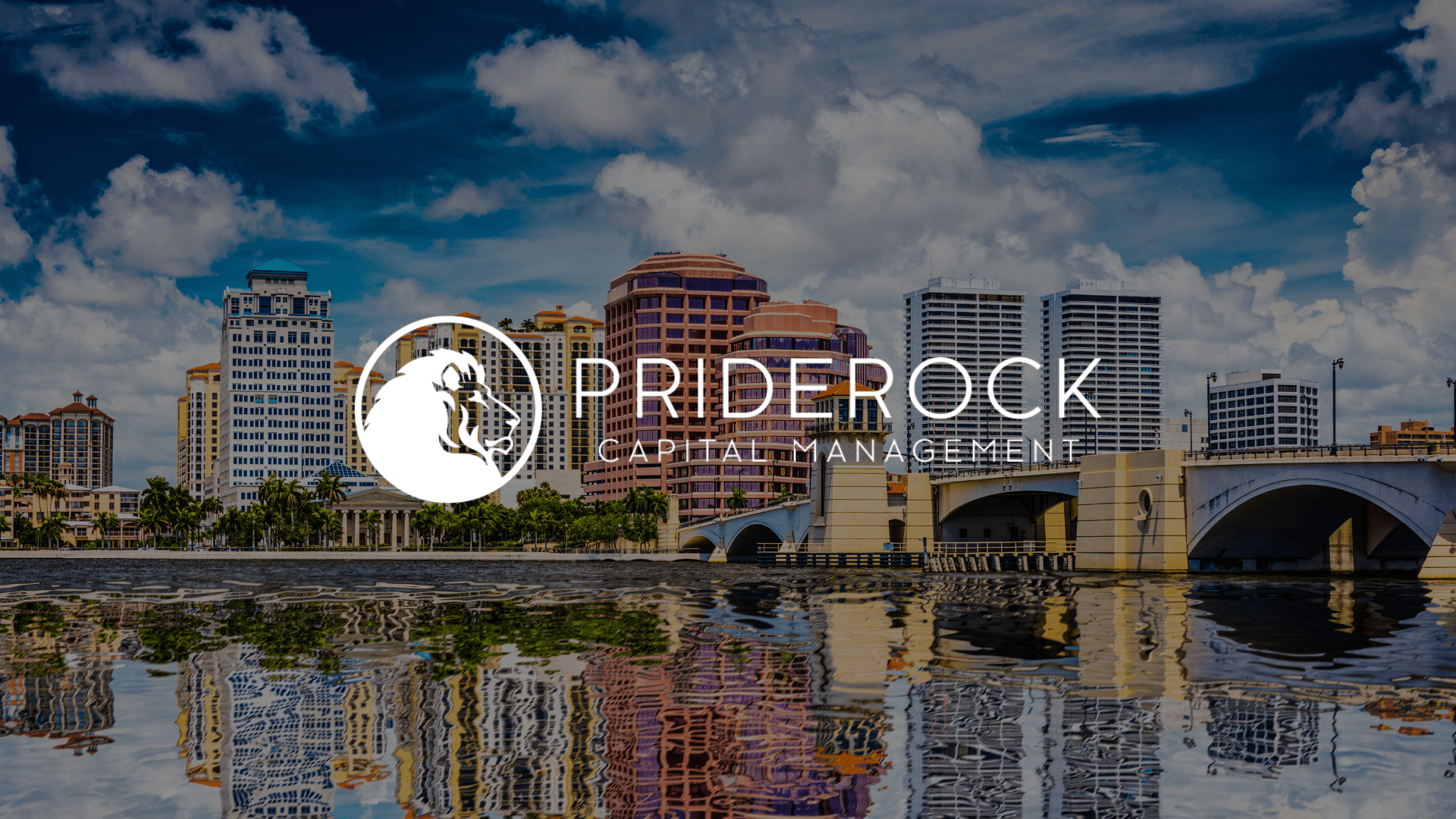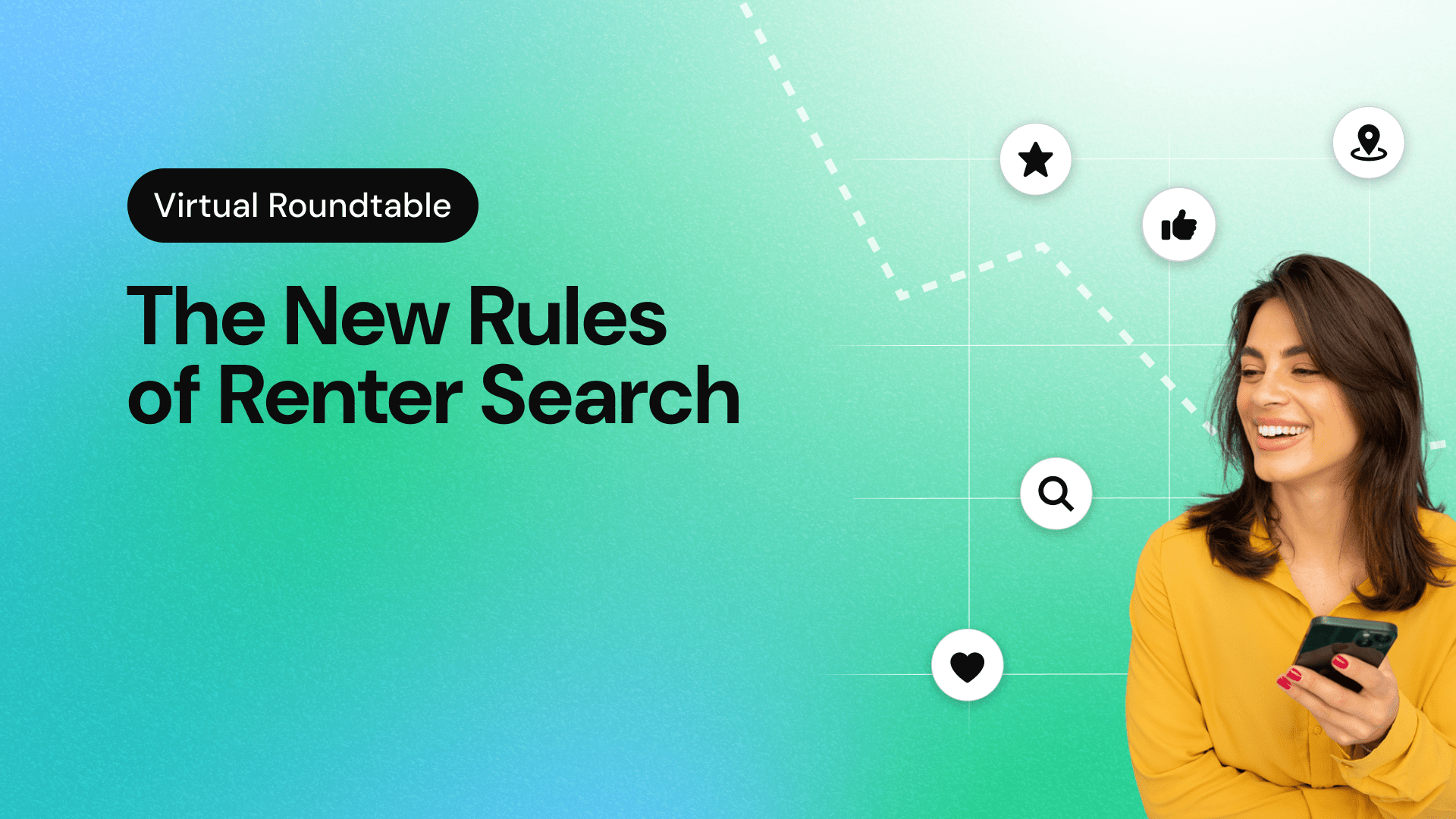The GenAI Local Search Ecosystem: Who Do These Models Actually Cite?
Generative AI (genAI) models are further integrating into people’s daily lives, including how we search online. Just look at the timeline and milestone markers below.
- OpenAI made ChatGPT public in November 2022 and it now boasts over 180 million monthly users.
- In July 2024, OpenAI announced the launch of SearchGPT.
- In February 2023, Microsoft unveiled Bing Chat, its AI-powered assistant, later rebranded as Bing Copilot in November 2023.
- Google released Gemini to the public in December 2023 and then rolled out AI Overviews (AIOs) in May 2024. In March 2204, Gemini had nearly 314 million visits.
In May 2024, we researched how the six major genAI tools performed with local searches. We found Google’s Gemini to be a top performer for local genAI searches.
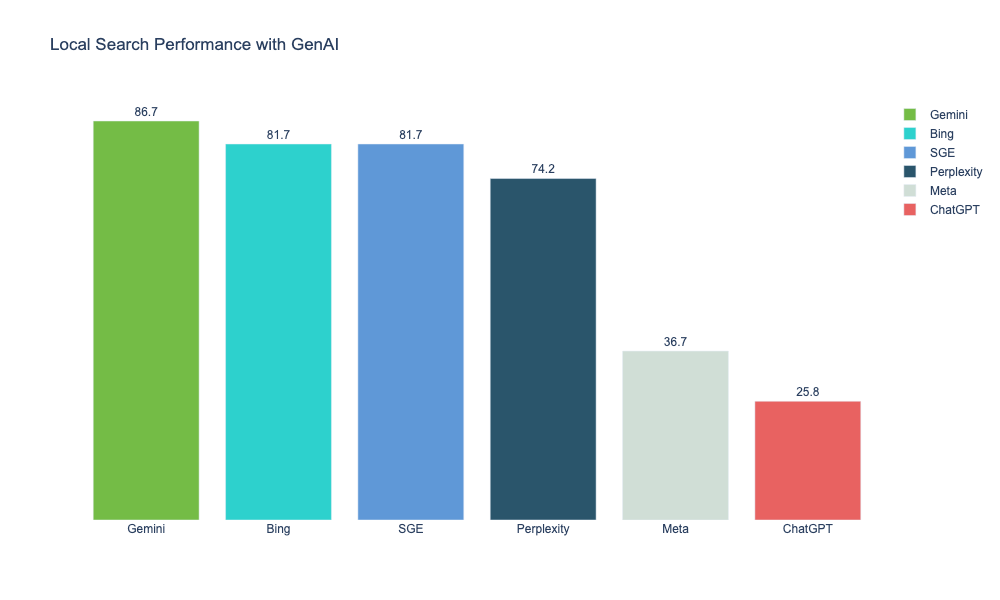
Now, we want to better understand where these genAI platforms pull information from, which local directories or websites are they citing, and how often?
The Methodology and Research
We conducted local searches across six industries on five major genAI models for this research.
Note, we didn’t use Google’s Search Generative Experience (now AI Overviews), due to Google pulling back how often they appear. At the time of this study, the AI Overviews seldomly appeared.
GenAI platforms studied:
- Gemini
- ChatGPT-4o
- Bing Copilot
- Meta AI
- Perplexity
Industries studied:
- Hotels
- Restaurants
- Retail
- Banks/FinServ
- Local Services
- Property Management
The searches were rather simplistic because we wanted to allow the GenAI models to find numerous local businesses. Too many details could narrow the results.
Loca queries submitted:
- Best hotels in downtown San Diego
- Breakfast burritos in Ocean Beach, San Diego
- San Diego retail stores for dogs
- Banks with the most ATMs in San Diego
- Car repair shop in mid city San Diego
- Best apartments with a pool in La Jolla, San Diego
Goals of the study:
- To understand where these six GenAI platforms pull information from and which local directories truly matter.
- To reveal how multi-location businesses can improve their rankings across these genAI platforms.
Top Takeaways
These genAI platforms source information primarily from established local directories, local articles, and businesses’ websites/local pages.
Across all genAI platforms, we noticed they cited these websites and local directories most often:
- Business’s websites
- Business’s locator or local page
- Local blogs, listicles, and news articles
- Yelp, Facebook, TripAdvisor
- Prominent industry-specific directories like TripAdvisor for hotel queries or Apartments.com for multi-family property searches
Keep reading to see how often these genAI platforms cited these various sources!
Which Platforms Produced the Most and Least Listings?
Gemini produced the most listings, averaging eight per search query. MetaAI came in second, followed by Perplexity.
Surprisingly, Bing Copilot produced the fewest initial local listings. However, it often included a map, citations, or local pack in its results, giving it a similar feel to a traditional search engine results page (SERP).
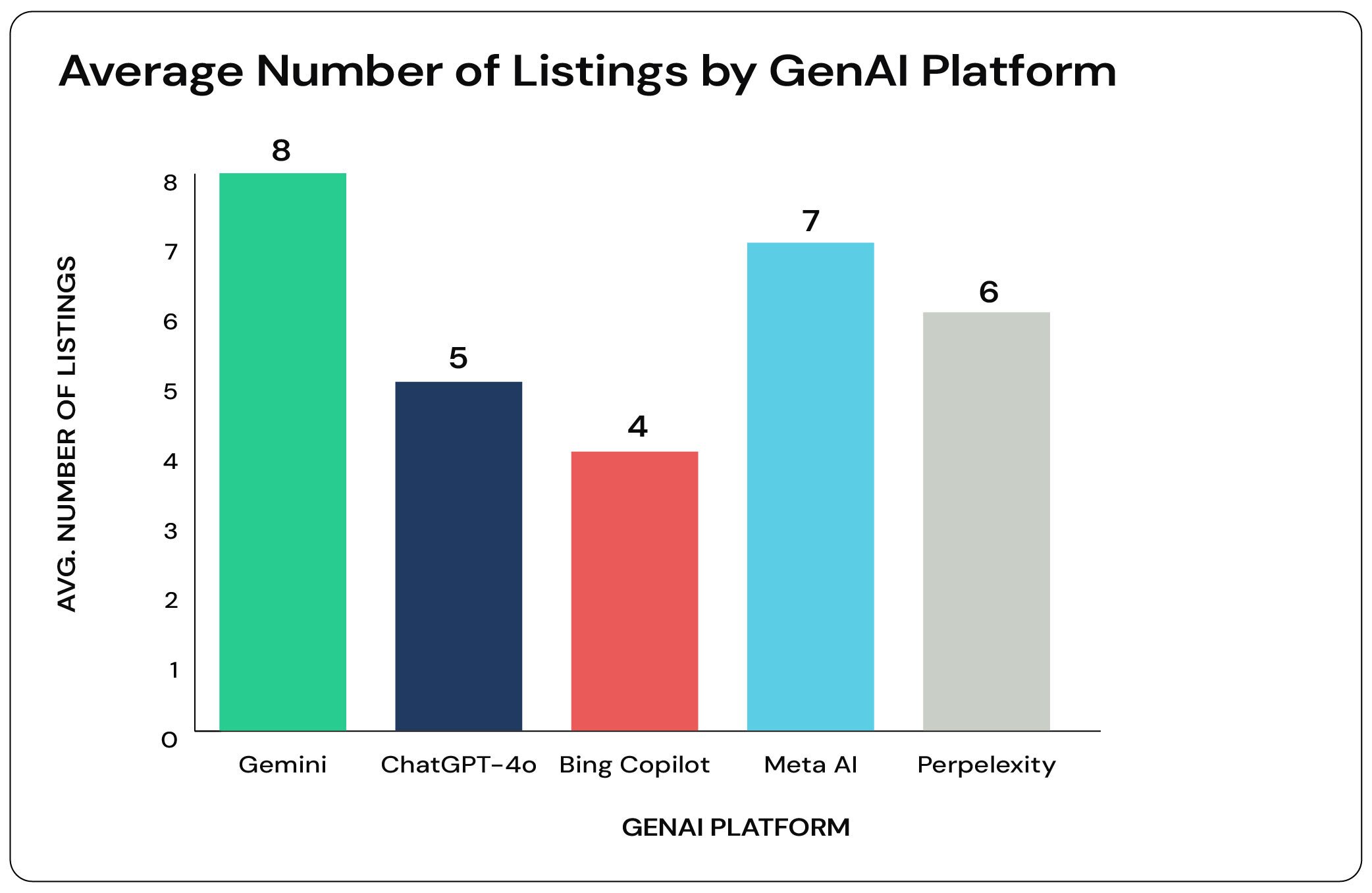
The Number of Listings Impacts Competition Across Industries
As for the number of listings or businesses that these GenAI platforms produced, retail leads the way with an average of 7.8 businesses listed followed closely by hotels with 7.6. Local services (4.2) and property (4.4) were at the bottom.
Evidently, the GenAI tools produced fewer listings for local services and property sectors, thus making these industries more competitive. Businesses in these industries must focus on enhancing their local SEO strategies to improve their performance across these various genAI chatbots.
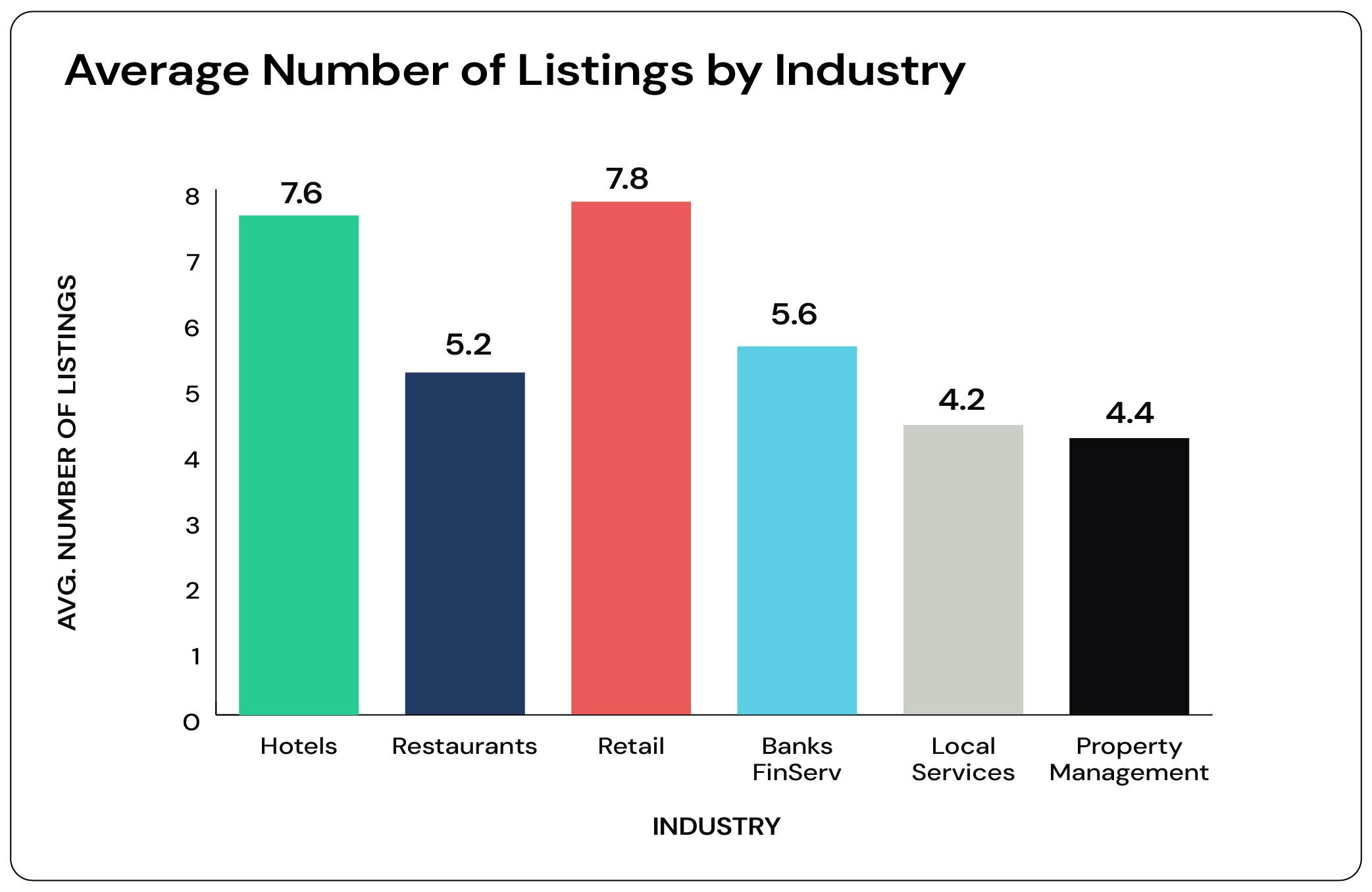
Now, let’s get into how each genAI model performed!
Where Each GenAI Platform Sources Results From
1. Gemini
As noted earlier, Gemini produced the most listings. The hotel (15) and bank/finserv (10) queries primarily drove this volume. But who did the AI model cite?
Out of the 15 hotel listings presented, Gemini cited TripAdvisor 40% of the time, a hotel’s website or local landing page 33% of the time, and Booking.com 27% of the time.
As for restaurants, retail and local services, Gemini almost exclusively cited business’s websites. Gemini also pulled dollar signs and star ratings from the associated Google Business Profiles (GBPs) for restaurants.
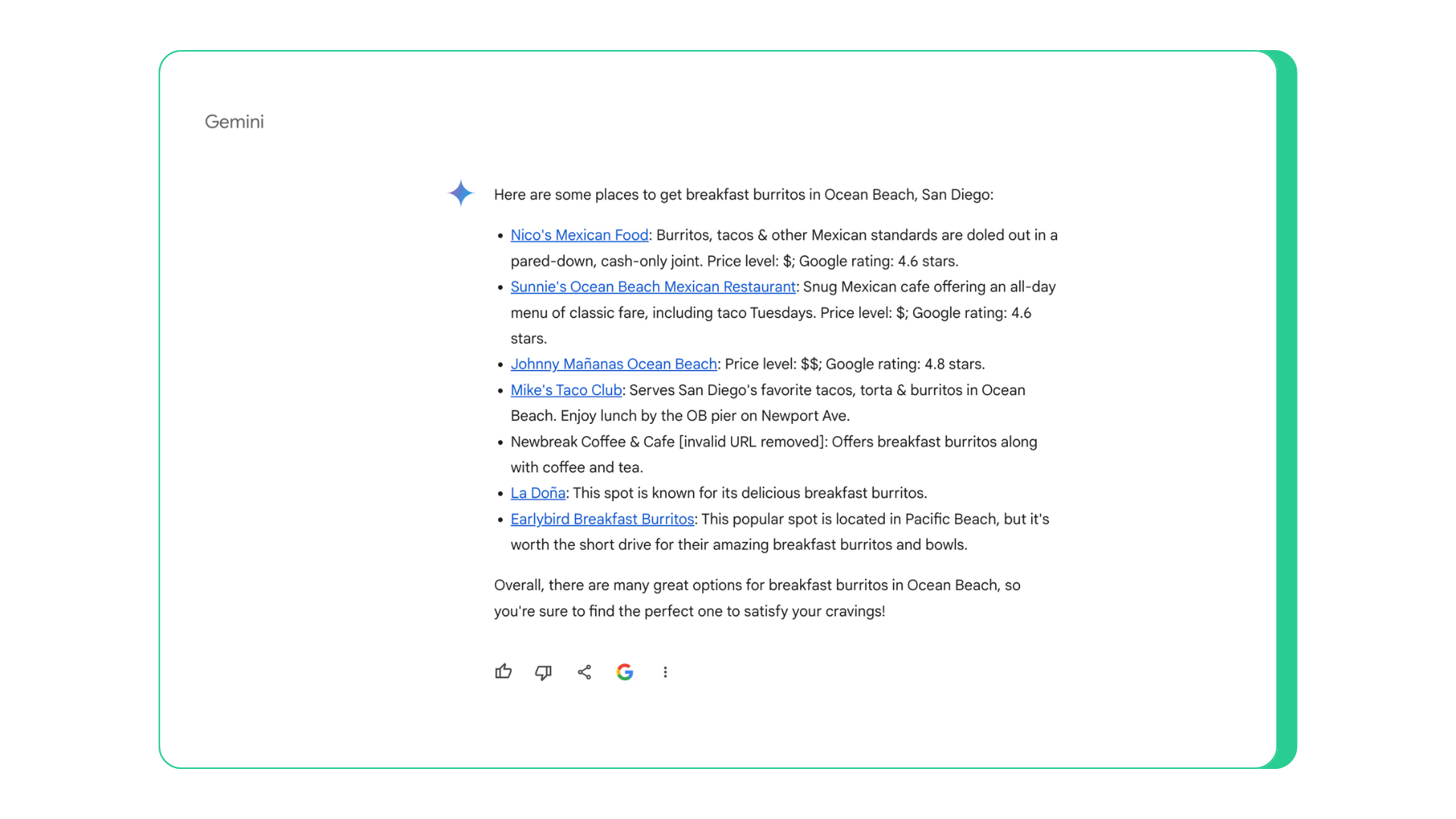
Main takeaways:
Gemini often cites business’s local websites and uses them to generate short descriptions. Thus, you must have up-to-date and detailed information about your business on your website or local pages.
For hotels and resorts, ensure you’re listed on TripAdvisor and Booking.com with detailed descriptions and favorable reviews. Restaurants in particular should fully optimize their GBPs and prioritize positive reviews, as Gemini often cited both in its results.
2. ChatGPT-4o
It’s important to note that despite not paying for memberships, we had enough free credits to use ChatGPT-4o — OpenAI’s most advanced ChatGPT model to date — to produce our results.
Without asking ChatGPT-4o to cite its sources, the AI platform only cited sources for the banks/finserv query, “Banks with the most ATMs in San Diego.” In this instance, it cited a local blog post on the best banks in San Diego and then a general blog post on how ATMs work.
However, when asked, “Please cite all of your sources,” ChatGPT-4o often searched on Bing.com using the original prompt or a related query. That’s no surprise, as OpenAI and Microsoft (Bing’s parent company) have a multibillion dollar partnership, where OpenAI agreed to use Bing as its default search experience for ChatGPT.
As for other sources, ChatGPT-4o often cited local blogs and listicles.
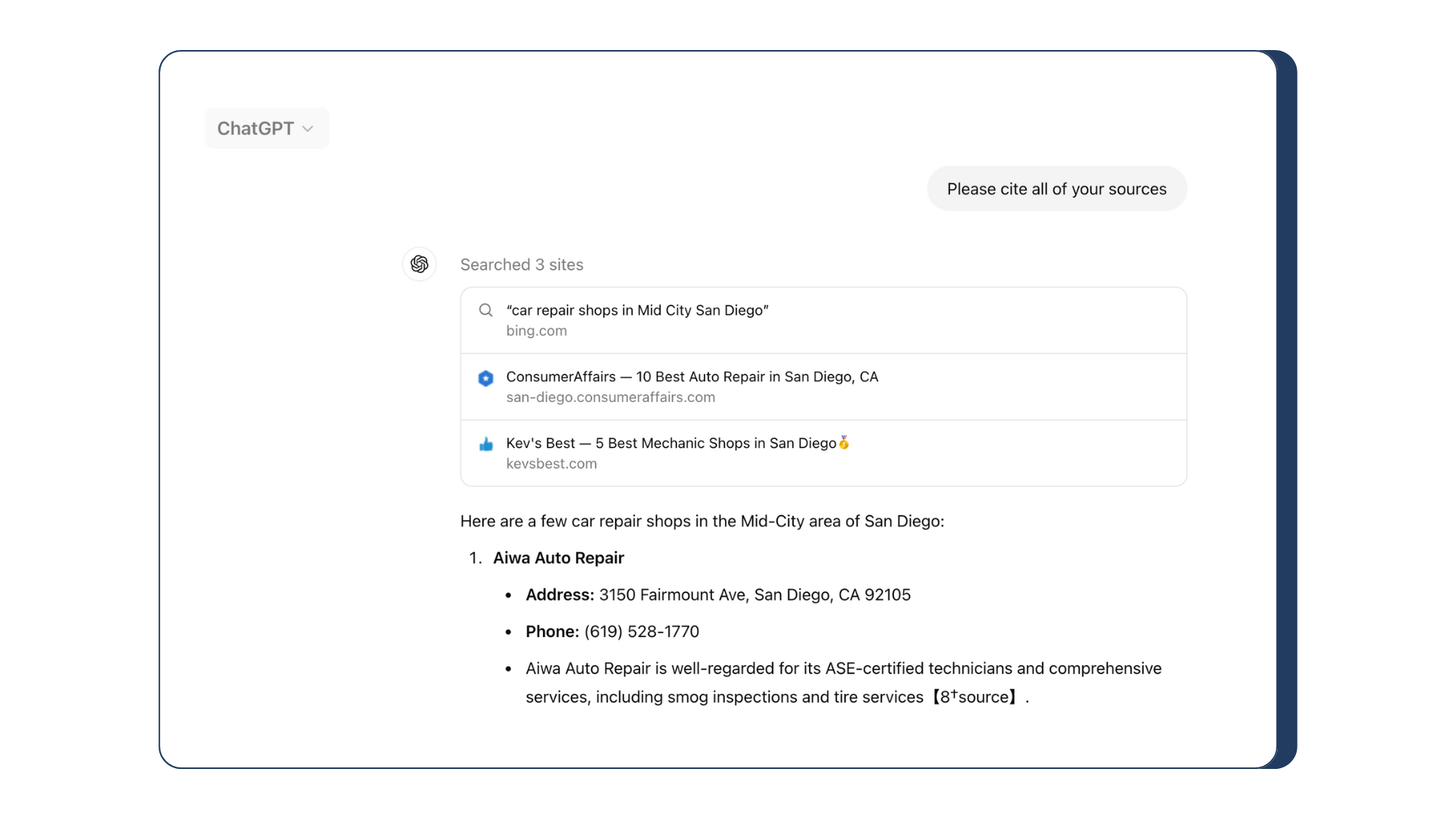
Main takeaways:
To improve your ranking on ChatGPT, focus on partnering with local news outlets and bloggers to get listed on their local blogs and listicles, as the AI platform frequently cites these. Additionally, ensure your content is well-optimized for Bing, given ChatGPT’s reliance on Bing for search results.
3. Bing Copilot
To no surprise, Bing Copilot often runs its search queries through Bing.com, with the search engine typically being the first few sources.
Currently, Bing Copilot looks the most like a traditional search engine mixed with a chatbot. The tool often presents a few business listings via bullet points and short paragraphs. Then, it gives a map and local pack.
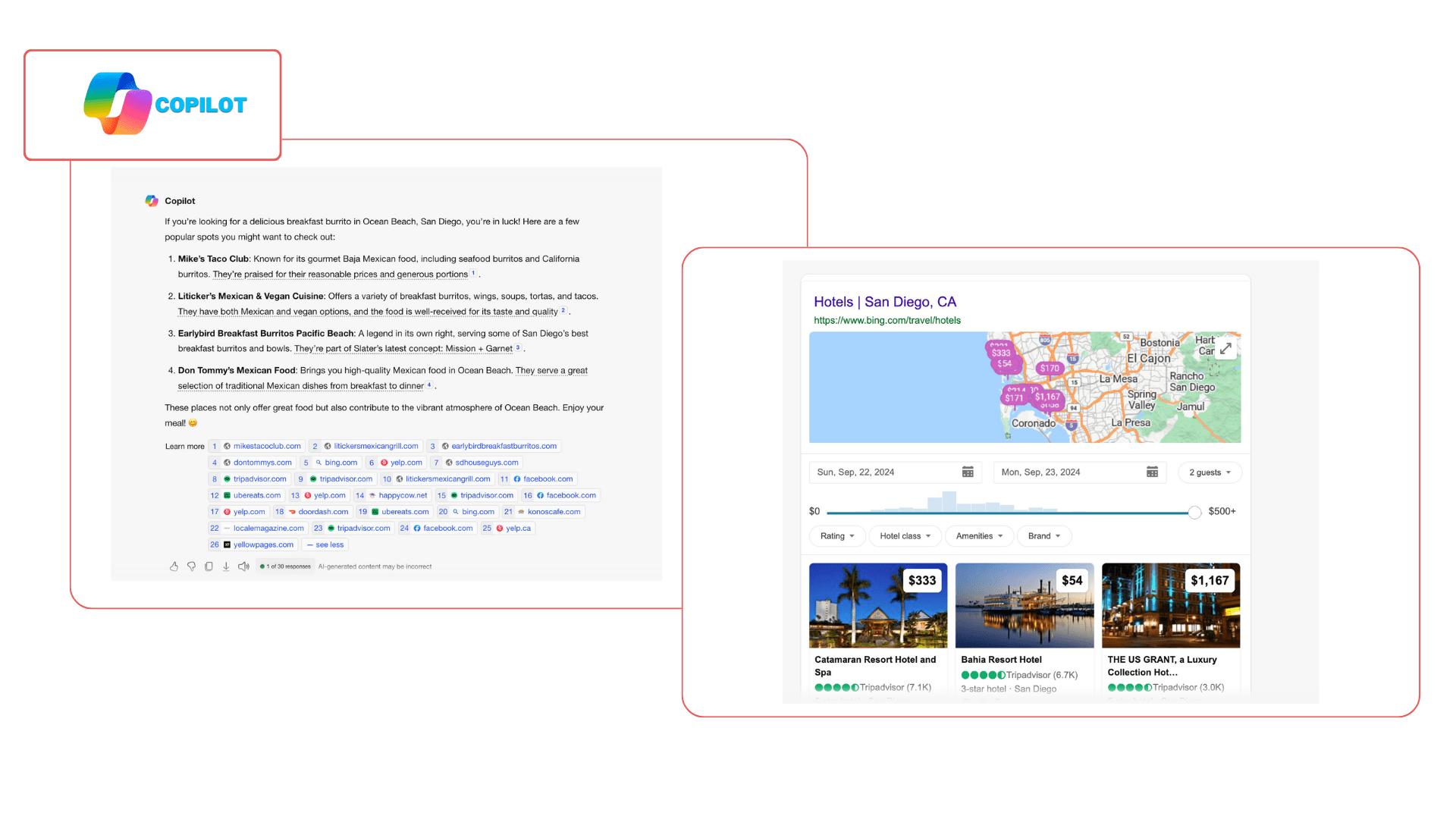
In terms of citations, Bing Copilot pulls from a variety of major local directories. For hotels, it pulls from Bing Travel and TripAdvisor.
While for restaurants, Bing Copilot often cited restaurant’s websites, Yelp, Facebook, Uber Eats, and DoorDash.
Note that for multi-location businesses, locators and local pages were often cited as sources. So, it’s imperative to have accurate and up-to-date information on them.
Main takeaways:
To improve your ranking on Bing Copilot, ensure that your business information is accurate and up-to-date on significant local directories like Yelp, TripAdvisor, and Facebook. Additionally, multi-location businesses should optimize their website and local pages to enhance visibility.
4. Meta AI
Meta AI often relies on Google Search, typically citing a Google search query. However, when clicking on the citations or view sources button, Meta AI linked to several top-ranking pages in Google’s search results.
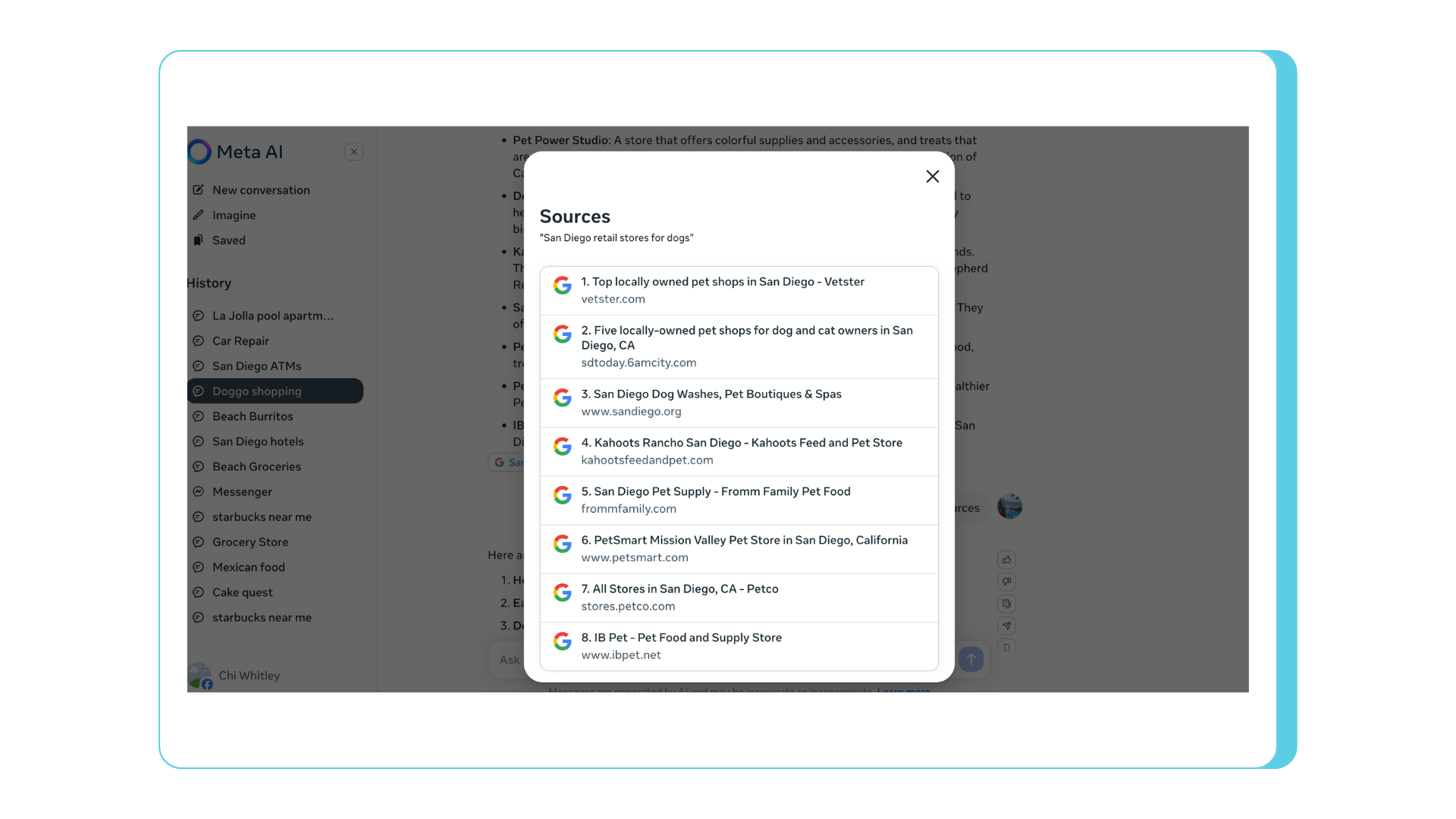
Meta AI’s business descriptions were primarily created from the website or local listings’ business descriptions that appeared in the Google Search results. It’s also worth noting that Meta AI often cites locators and local pages.
Main takeaways:
It seems that if you implement the same general and local SEO tactics to appear in Google Search results, you’ll likely also appear in Meta AI’s results.
5. Perplexity
Perplexity typically followed a set pattern with its responses. It would place sources at the top, along with a map and some photos. Then, the ‘Answer’ portion included the business name, location, rating (sourced from Yelp), and a one or two sentence business description.
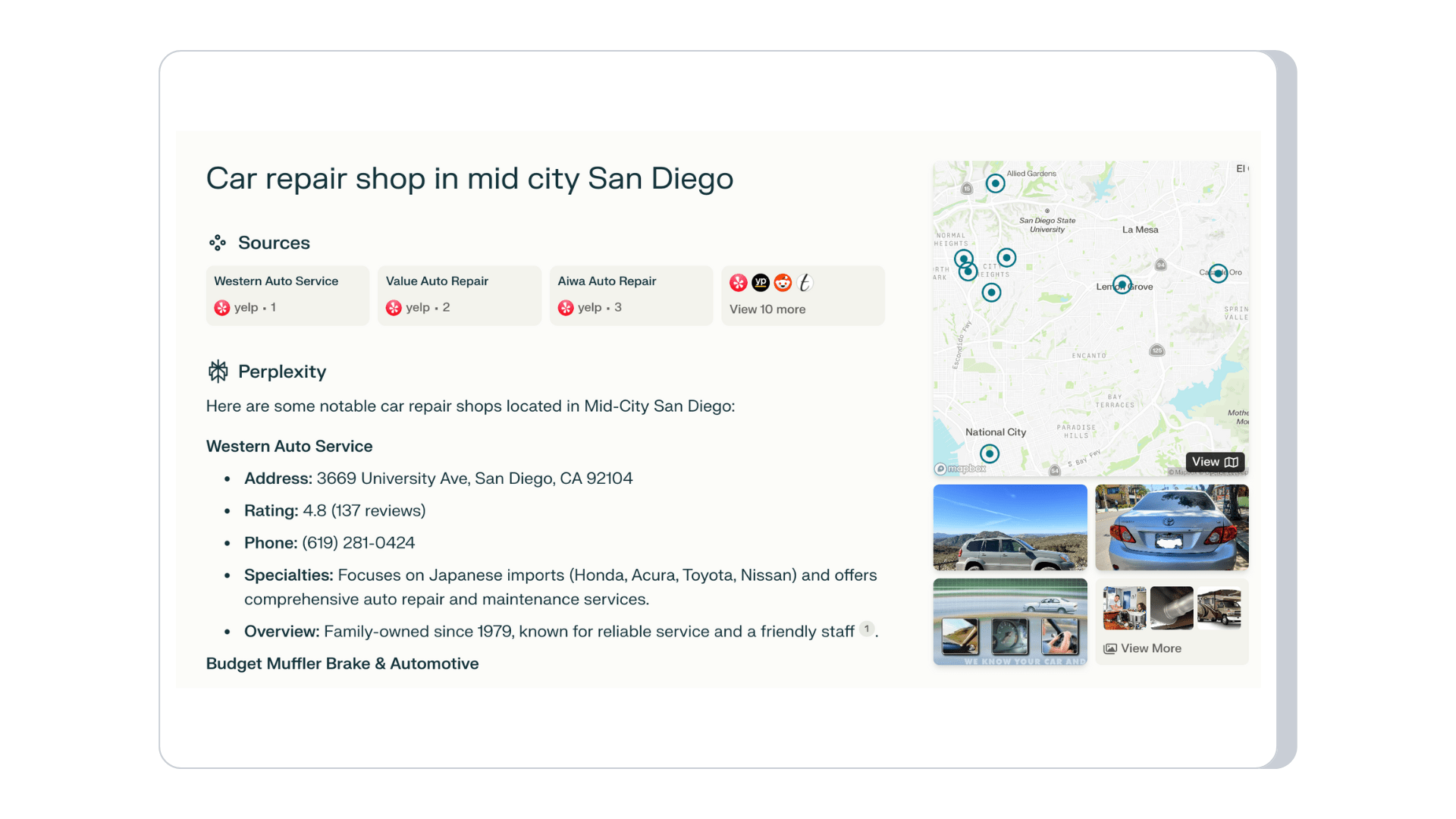
It’s worth noting that Perplexity almost always cited Yelp with its first three sources, likely due to their data licensing partnership.
Despite primarily citing Yelp, Perplexity’s other citations aligned with Google’s search results, including local directories like TripAdvisor and Apartments.com. Like the other genAI platforms, Perplexity also frequently cites local businesses’ web page, articles, and listicles.
Main takeaways:
To improve your ranking on Perplexity AI, ensure your business is accurately listed and highly rated on Yelp, as Perplexity frequently cites Yelp due to their partnership. Additionally, continue to optimize your local listings on travel directories and maintain up-to-date information on your business’s web pages.
How Partnerships Play Into These Local Gen AI Citations
As we’ve seen from some of the local results, partnerships between local directories or tech companies and these AI companies heavily influence which platforms the AI models cite and results.
For instance, OpenAI’s partnership with Microsoft has all versions of ChatGPT searching Bing.com for sources. Similarly, Perplexity’s agreement with Yelp involves the model sourcing and referencing Yelp Businesses.
It’s worth monitoring how these current partnerships progress and whether new ones arise that will affect these genAI models.
How SOCi Can Help
It’s clear that these five genAI platforms produce varying local results based on the industry and query. Their continued rise in usage and ongoing updates make it particularly challenging for multi-location businesses to appear in their results.
So, why not use AI to rank in these genAI platforms?
Our CoMarketing Cloud, powered by Genius AI, our AI automation layer, forms a single data foundation that analyzes hundreds of sources for each business location and makes location-specific recommendations.
It’s like having 1,000 data scientists and marketers at your fingertips!
For instance, Genius Search leverages AI to analyze real-time data from various sources, including search trends, social media, customer reviews, and competitive insights, to make recommendations you can implement with a few clicks.
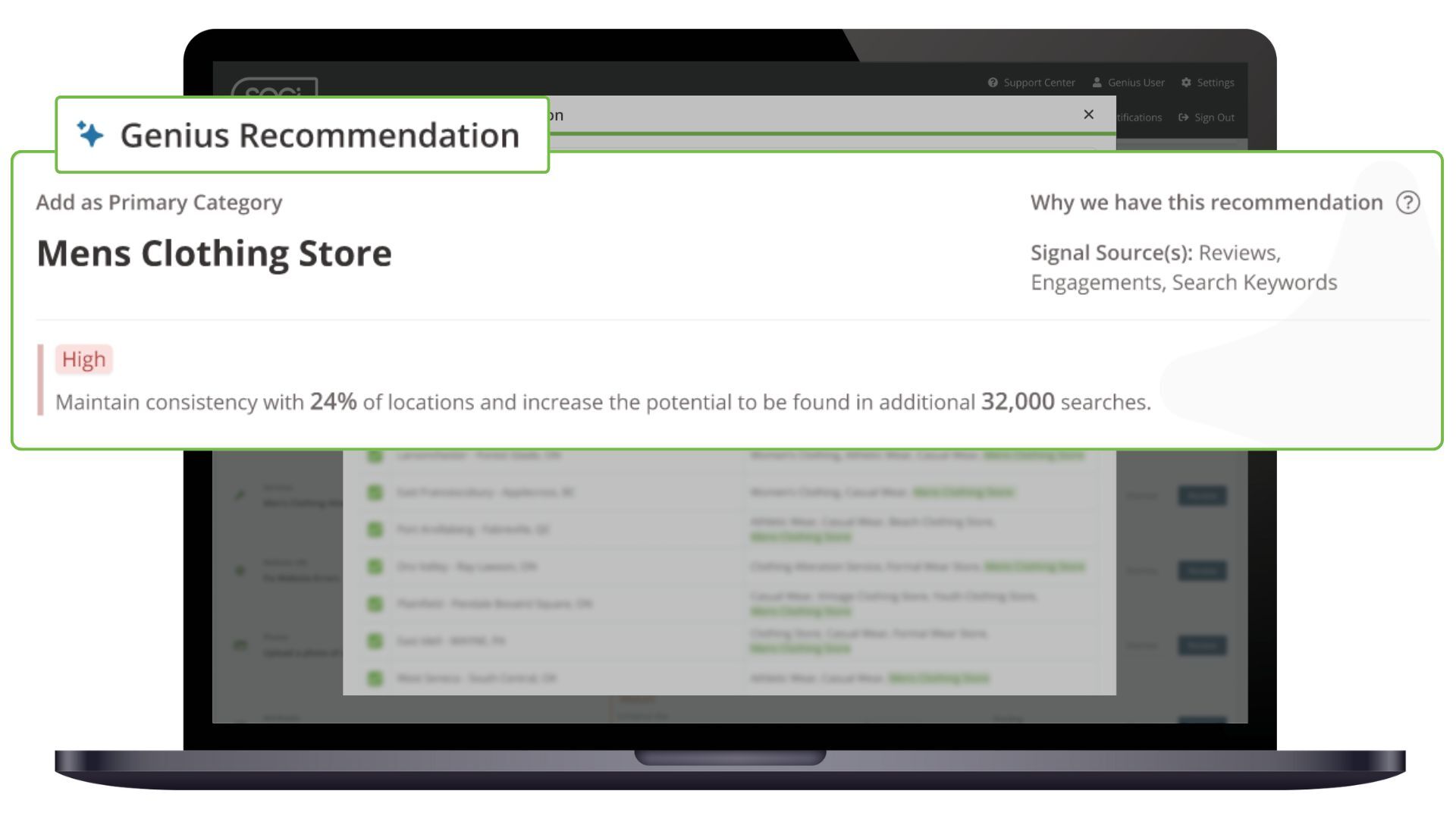
This tailored comprehensive analysis and recommendations will increase your visibility on search engine results and, thus, these genAI platforms.
Plus, Genius Social is local-smart, crafting targeted social campaigns and posts that speak your community’s language while letting you reply to comments with a locally branded voice.
Similarly, Genius Reviews turns the daunting task of managing and responding to reviews, regardless of volume, into a walk in the park.
See how our CoMarketing Cloud makes it effortless to manage your local businesses and boost their rankings in traditional and genAI search results.
Request a personalized demo today!






